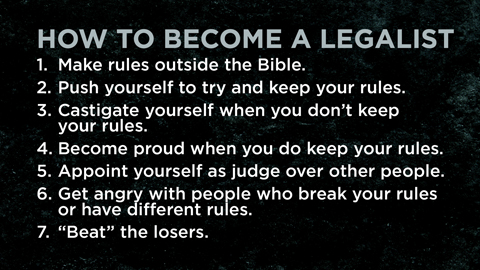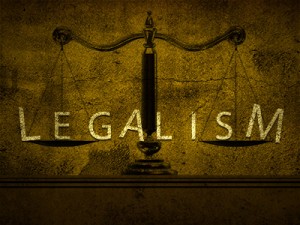 A reader recently sent in this astute question:
A reader recently sent in this astute question:
Why does Jesus tell people to “Go and sin no more” when He knew it was basically impossible for them to stop sinning?
This is a great question, and one that has been cropping up a lot in the comments on this blog recently. For example, check out some of the comments in my post about “How do I stop sinning?”
“Go and Sin No More” Disclaimers
Before I attempt to answer this important question about what Jesus means when He says “go and sin no more,” let me state two disclaimers.
Yes, I know that Scripture contains numerous passages which seem to teach that sinless perfectionism is possible in this life (cf. Matt 5:48; 1 John 3:4-10). So please … don’t leave a comment below quoting all the text in the Bible which you think I haven’t read. I have read them, studied them, and believe them. I simply have a different understanding of those texts than you do.
Second, just because I believe the Bible teaches that it is not possible in this life to go and sin no more at all ever again in any way, this is not at all the same thing as telling people to go sin all they want. I believe that Christians can and should stop sinning, but I approach the issue of sin differently than often encountered elsewhere. I think the primary reason God wants us to stop sinning is not because it offends Him, but because sin damages us.
So can we “Go and Sin No More”?
There are two times in the Gospels when Jesus tells people to “go and sin no more.” One is after Jesus healed the man by the Pool of Bethesda (John 5:14) and the other is after He rescued the woman caught in adultery from getting stoned to death (John 8:11).
“Go and Sin No More” in John 5:1-18
What is strange about the instance with the man by the Pool of Bethesda is that the text mentions no sin which had led to his condition. The text simply says he had been there for 38 years (John 5:5). We aren’t told why. We aren’t told what happened. Though most commentators say that the man must have sinned in some way to cause his condition, the text says nothing of the sort.
Bible scholars say, “Well, it must have been some sort of sin which led to the man’s condition, or else why would Jesus say, ‘Go and sin no more or else something worse will happen to you’?”
Really? I have major problems with this. First, if the man had been invalid for 38 years, how old could he have been when he committed this terrible sin which caused God to strike him down as an invalid for the next four decades? I mean, what sort of terrible sin had this child from 38 years ago (or possibly a teenager) committed, which would cause God to punish him in such a terrible way?
And then, Jesus comes along and say, “Now don’t do that again, or I’ll have to punish you even worse!”
Does that sound anything like Jesus? Not the Jesus I know. I don’t think that sin led to this man being an invalid for 38 years, and I definitely don’t think that Jesus was threatening this poor man with some greater punishment if he committed that sin again.
So how then are we to understand Jesus’ statement, “Go and sin no more”?
Well, notice that it is not in the context of healing the man from being an invalid that Jesus says “Go and sin no more.” It is in the context of the religious leaders threatening the man’s life because he had the audacity to carry his bedroll on the Sabbath (John 5:10). Why do I say there were threating his life? I believe there is a parallel in John 5 with something that happens in Numbers 15:32-35.
There, man is caught picking up sticks on the Sabbath, so they arrest him and take him to Moses, who consults God on the matter. God (apparently) tells Moses that the community should stone the man for the high crime of picking up sticks on the Sabbath.
So when Jesus tells the man “Go and sin no more or else something worse might happen to you,” I think he says it with a sparkle in His eye, some satire in His voice, and a head nod toward the disapproving and judgmental religious leaders.
Essentially Jesus tells the man (read the following with soft sarcasm): “Oh no! You carried your bedroll on the Sabbath! How could you do such a terrible thing! You sinner! Stop it! If you don’t, they’re going to have your head.”
Of course, although Jesus was speaking to the man with satirical humor, the situation was deadly serious as well, and Jesus knew it. It was true that if the man was not careful, the religious leaders would try to kill him simply because he carried his bedroll on the Sabbath. In fact, in the very next verses, their murderous rage gets redirected toward Jesus because He is the one who told the man to carry His bedroll (John 5:15-18). The text says they sought for a way to kill Jesus. The “something worse” which was going to happen to the man is now directed toward Jesus.
So was Jesus telling the man to “Go and sin no more”? Well … yes, but it is more like this: “Go and ‘sin’ no more, or the sin police over there are going to kill you.”
That’s how I read John 5:15-18.
Based on this, you can probably predict how I understand John 8:1-11.
“Go and Sin No More” in John 8:1-11
I think John included this incident in his Gospel just a few chapters after the “grievous sin of bedroll-carrying incident” because unlike the carrying of the bedroll on the Sabbath, the woman in this event was truly sinning. She was caught in the act of adultery.
 The religious leaders are about to stone her to death when Jesus shows up, scribbles in the sand, and when no one is left to condemn her, tells her to “Go and sin no more.”
The religious leaders are about to stone her to death when Jesus shows up, scribbles in the sand, and when no one is left to condemn her, tells her to “Go and sin no more.”
Most commentators note the connection here with the Levitical law that the punishment for adultery was death by stoning (Lev 20:10; Deut 22:22). Most commentators also point that the Levitical law required that both the man and the woman are to be stoned, but in John 8, only the woman is present. This was not because the religious leaders didn’t know who the man was, for they had caught the woman in the very act of adultery. Where is the man? We do not know.
There is some speculation that this woman was simply the innocent bystander in a malevolent plan by the religious leaders to accuse and attack Jesus (John 8:6). Since John 5:1-18, the religious leaders had been looking for ways to discredit and kill Jesus, and they had now found (or created?) a way in this poor woman. Could it be that her guilty partner was involved in the scheme himself?
It is likely that the woman was actually a prostitute, and the religious leaders saw this situation as a “win-win” opportunity for them. If Jesus did not defend her, then they got to stone a prostitute. Yay! If Jesus did defend her, then they could stone Him too as a bonus.
The plan, of course, didn’t go as expected, and Jesus wrote something in the sand which caused all the men to slink away. We don’t know what He wrote, though there is endless speculation about it might have been.
Anyway, once they have all left, Jesus tells the woman that He does not condemn her (and He is the only one present who could have!), and that she should “Go and sin no more.”
Why? For the same reason Jesus told the man in John 5 to go and sin no more: because the religious leaders were out to get her. Now that they had been rebuffed by Jesus and their righteous activity of stoning a prostitute had been denied them for the day, they would doubtless begin looking for a way to kill her again.
 Basically, Jesus is saying, “My beautiful lady, I am sorry you got caught up in this. They were after me; not you. They framed you to get at me. I want to protect you from them, so please, consider leaving your current profession. They are likely going to seek to frame you again, and the next time, they won’t bring you to me. They’ll just kill you. Neither one of us want that, so go … do something different with your life.”
Basically, Jesus is saying, “My beautiful lady, I am sorry you got caught up in this. They were after me; not you. They framed you to get at me. I want to protect you from them, so please, consider leaving your current profession. They are likely going to seek to frame you again, and the next time, they won’t bring you to me. They’ll just kill you. Neither one of us want that, so go … do something different with your life.”
Clearly, Jesus did not mean that the woman should never sin again in any way whatsoever. He knew, and we know, that this is impossible. He was simply warning her about the danger of continuing in her current lifestyle.
Can you “Go and Sin no More”?
So what does this way of reading these texts say to you and me? Several things.
First, please, please, please … don’t be a religious jackass. If Jesus is the only one who has the right to condemn and judge a person, but He chooses not to (cf. John 8:11, 15), then we all better think twice (and thrice!) before we cast the first stone. Don’t call for people’s jobs, or pray for their house to burn down, or tell them that because of their lifestyle they are headed for hell.
Such behavior looks less like Jesus and more like the religious leaders who sought to kill Jesus.
Second, recognize what sin is (and isn’t). Sin damages our relationship with God and with one another. Sin destroys our lives and causes emotional, financial, physical, spiritual, and psychological harm. The reason God wants us to stop sinning is simply because God wants what is best for us, and sin does not result in God’s best.
Our sin doesn’t cause God to turn away from us, reject us, hate us, or cast us out. Our sin grieves God because He knows how much sin hurts us, and as our loving Father, He doesn’t want us to get hurt.
God doesn’t care about our sin; He cares about us — which is why He wants to help us not sin.
Finally, as I’ve said before, we stop sinning not by trying to stop sinning, but by walking with Jesus and inviting God into the dark places of our life. When a room is dark, you don’t chase away the darkness by talking against it, praying against it, and commanding the darkness to leave. No, darkness naturally recedes when light enters the room. You want to stop sinning? Invite God into it, and watch the light of His love cast out all sin.






 Recently someone sent in a question about the sin unto death.
Recently someone sent in a question about the sin unto death.




 It’s doesn’t look like sin! But at it’s core, legalism fosters pride, arrogance, judgmentalism, and self-righteousness.
It’s doesn’t look like sin! But at it’s core, legalism fosters pride, arrogance, judgmentalism, and self-righteousness. Yes, Jesus said that “Unless your righteousness exceeds that of the Scribes and Pharisees, you will never enter the Kingdom of heaven” (Matthew 5:20). But Jesus was not calling His followers to become more righteous than the scribes and Pharisees. He was saying that when it comes to personal righteousness, you have to be more perfect than the scribes and pharisees, which is impossible! Therefore, don’t even try! Fall upon the grace, mercy, and love of God instead.
Yes, Jesus said that “Unless your righteousness exceeds that of the Scribes and Pharisees, you will never enter the Kingdom of heaven” (Matthew 5:20). But Jesus was not calling His followers to become more righteous than the scribes and Pharisees. He was saying that when it comes to personal righteousness, you have to be more perfect than the scribes and pharisees, which is impossible! Therefore, don’t even try! Fall upon the grace, mercy, and love of God instead.